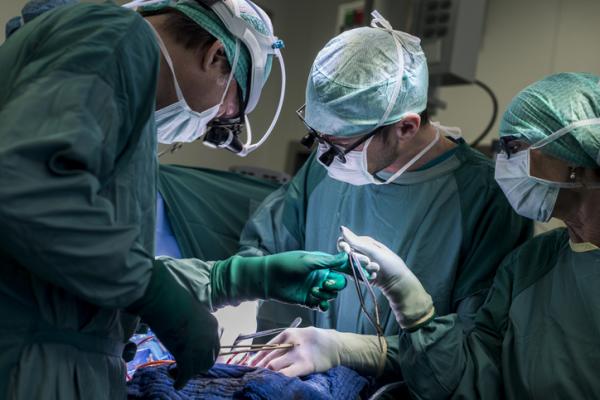
The first patients treated in the United States with the world’s smallest heart pump are part of an FDA-approved Early Feasibility Study which Magenta Medical has initiated in two leading NY cardiology centers with its Elevate percutaneous Left Ventricular Assist Device (pLVAD) for the high-risk percutaneous coronary intervention (HR-PCI) indication. Image courtesy: Getty Images
June 7, 2023 — Magenta Medical Ltd. has announced the initiation of its FDA-approved Early Feasibility Study with the Elevate percutaneous Left Ventricular Assist Device (pLVAD) for the high-risk percutaneous coronary intervention (HR-PCI) indication. The study began with the treatment of two patients: one in Mount Sinai Health System and one in St. Francis Hospital and Heart Center, both in New York, according to a statement released by the miniature heart pump developer.
Patients with coronary artery disease are often referred to a catheterization procedure to open blockages in the arteries feeding the heart, with the goal of improving their quality-of-life and reducing the risk of heart attacks, noted Magenta Medical’s announcement. It further added that some of these patients present with more severe disease, making them prone to instability during coronary intervention, and thus categorized as high-risk. In these patients, it is advantageous to provide mechanical circulatory support during the procedure to preserve systemic blood pressure and maintain perfusion of vital organs, including the heart itself. Since the duration of support for this indication is typically short (up to 6 hours), with patients ambulatory soon following the procedure, Magenta Medical notes it is particularly important to limit the insertion profile of the device in order to minimize vascular access complications.
The company offered the following specifications on its technology: Having secured FDA Breakthrough Device Designation, Magenta Medical’s proprietary technology miniaturizes a powerful blood pump to fit an 8 Fr delivery system — the smallest crimping profile of any such device. The percutaneous Elevate heart pump is inserted over a guidewire through commercially available 10 Fr introducer sheaths that require a small puncture in the groin. The flow of the pump is adjusted based on the clinical circumstances of the patient, up to 5 L/min of mean flow, making it the most powerful pump of its kind.
The Elevate Early Feasibility Study was approved by the FDA to evaluate the safety and feasibility of the Elevate system in providing temporary mechanical circulatory support during HR-PCI procedures, and, according to the company, constitutes the first step in a clinical program intended to secure approval for the device in the US for this indication.
The first patient was enrolled in the study by Samin Sharma, MD, Director of Interventional Cardiology at the Mount Sinai Health System in New York. The patient underwent a high-risk procedure for severe three-vessel disease and received hemodynamic support by the Elevate system throughout the procedure.
“I am delighted to be partnering with Magenta Medical on this study,” said Sharma. “The three cardinal features of the Elevate pLVAD — small insertion profile, ease-of-use, and high pump flow — will enable us to benefit many more appropriately selected complex PCI patients, where current devices are limited due to larger insertion sizes,” added Sharma.
The second patient was enrolled in the study by Richard Shlofmitz, MD, Chairman of Cardiology at St. Francis Hospital and Heart Center in New York. This patient also underwent a complex, meticulous PCI involving multiple vessels, resulting in a complete revascularization of the coronary tree. Robust hemodynamic support was provided throughout the procedure and weaning from the Elevate system was successfully performed in the catheterization laboratory.
“As a recognized leader in cardiovascular research, St. Francis is thrilled to be a part of this study. We are excited about the prospects of the Elevate system given the unique combination of simplicity, attractive insertion profile, and the full hemodynamic support the pump can provide,” said Shlofmitz. He added, “In a busy practice such as ours that promotes clinical excellence with unwavering patient safety, the Elevate system could have a significant impact on patient outcomes.”
“Magenta is proud to partner with top cardiology centers in the United States to further the validation of its technology and provide cardiologists with a powerful tool to support their high-risk patients during complex procedures,” said David Israeli, MD, MBA, CEO of Magenta Medical. “We are looking forward to a speedy recruitment process and favorable study outcomes that would allow us to take the next step in the clinical program towards ultimate market approval.”
The company further noted that Elevate is an investigational device, limited by Federal law to investigational use only. The technology received Breakthrough Device Designation from the FDA for two indications: high-risk percutaneous coronary intervention and cardiogenic shock.
Magenta’s Elevate percutaneous left ventricular assist device (pLVAD) is currently in clinical testing, with the ultimate goal of securing approval for at least two indications: patients undergoing high-risk coronary interventions and patients with cardiogenic shock. As such, Magenta’s Elevate percutaneous left ventricular assist device (pLVAD) is currently in clinical testing, with the ultimate goal of securing approval for those indications, according to the company.
For information: https://magentamed.com/


 November 14, 2025
November 14, 2025 









